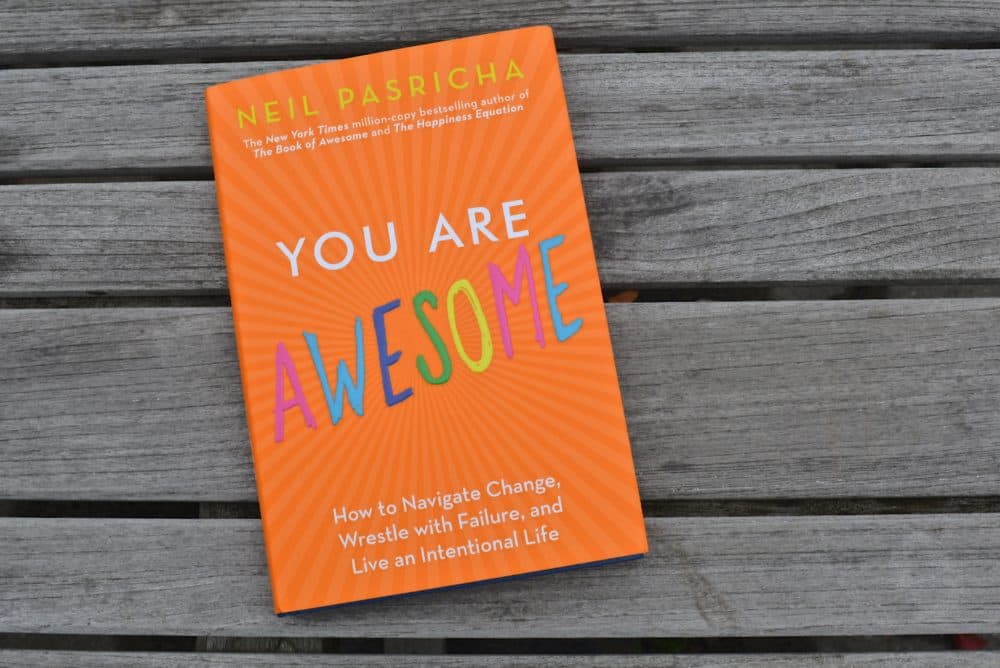Advertisement
Are You Failing At Failing? Author Neil Pasricha Says It's Time To Change The Narrative

Author Neil Pasricha spends one day per week so far off the grid even his wife doesn’t know where he is.
On what he calls “untouchable days,” he refrains from connecting his computer to the internet or reaching for his smartphone. Unplugging from technology for the day helps him focus on writing and producing his podcast, he says.
“If you drink a bottle of wine right before you went to bed, and if you woke up and drank a bottle of wine, and you slept with a bottle of wine, we'd probably call you an alcoholic,” he says. “When everyone has an addiction, it is more difficult to see.”
In his new book, “You Are Awesome: How to Navigate Change, Wrestle with Failure, and Live an Intentional Life,” Pasricha examines why so many people feel anxious and frail despite living in what he calls the “greatest time ever to be alive.”
The technology that allows us to live so well is a big part of the reason so many people are unhappy, he says.
A key part of happiness is learning how to deal with failure — something the convenience of technology has made people forget, he says.
“You can press a button these days and a car whisks you home. You have takeout waiting on your front porch. Your cell phone entertains you. We live like kings,” Pasricha says. “But the side effect of living like that is that we no longer have the tools to handle failure or even perceived failure.”
Spending too much time on the internet causes problems with productivity as well as psychological and physiological health, he writes. Looking at screens before bed reduces melatonin levels and decreases sleep quality, for example.
Social media is damaging to many people’s mental health because it leads us to compare ourselves to people who we perceive are better than us, he says.
“No matter how good the lunch you and I have together today, somebody's at a lobster buffet in the Maldives on Instagram. So you are in a permanent state of anxiety because you can't win anymore,” Pasricha says. “You're comparing everybody else's greatest hits with your director's cut life.”
Advertisement
Pasricha offers his readers secrets to happiness throughout the book, like “tell yourself a different story” when a difficult situation spirals into negative, hopeless thoughts.
The New York Times best-selling author worked in the business world at big companies like Procter & Gamble and Walmart before he quit the corporate world to study happiness.
While writing this book, Pasricha says he learned about the end-of-history illusion — a psychological phenomenon where people believe they will not grow and mature beyond their current situation.
When he worked at Walmart, part of his job was to help people who were fired pack their boxes and walk to their cars. After losing their jobs, people often drew the conclusion that their lives were over, he says. But years later, many of them have told him getting fired from the company was a blessing.
“We all catastrophize. We think where we are today is where we're gonna be forever. Unfortunately, that means if you lost your job or you got dumped or something went bad, you think you're stuck there,” he says. “But use the end-of-history illusion to actually reimagine that this could be a step towards a future that you just can't see yet.”
Francesca Paris produced and edited this interview for broadcast with Kathleen McKenna. Allison Hagan adapted it for the web.
Book Excerpt: 'You Are Awesome'
Why Creating “Untouchable Days” May Be The Most Productive Thing You Do This Year
How many meetings do you have a day?
If you’re like most people the answer is “Too many!”
Meetings aren’t just meetings either, are they? They sort of sit subconsciously in our brains, taking up space, requiring preparation, sometimes travel, and often more meetings. They’re infuriating! So I went deep on this topic while writing my new book on resilience You Are Awesome: How To Navigate Change, Wrestle With Failure, and Live an Intentional Life.
See, when I worked as Director of Leadership Development at Walmart, my days were full of meetings. Everybody’s were! And when I quit two years ago to strike out on my own as an author and keynote speaker, I thought my days full of meetings were behind me.
But I was wrong.
I now have research calls and phone interviews, lunches with agents and web developers, conference calls about book titles and publishing schedules, and radio interviews and media prep calls. And before every speech I give, there’s always a meeting with the client and meeting planner to clarify goals and logistics for the event.
Meetings never really go away.
But the problem is that I’m now measured almost solely on my creative output. And there’s no time for it! It’s not just me, either. As our world gets busier and our phones get beepier, the scarcest resource for all of us is becoming attention and creative output. And if you’re not taking time to put something new and beautiful out into the world, then your value is diminishing fast.
I used to be one of those “wake up at 4 a.m.” or “keep chugging ‘til 4 a.m.” guys who grinds away at work for hours while everybody else sleeps. It’s how I wrote a thousand blog posts in a thousand days. But I now understand that you can only drive in the express lane for so long before the wheels come off.

When I first became a full-time author, I found that my writing time was suddenly completely gone.
I thought back to my blogging days and realized I used to be one of those “wake up at 4:00 a.m.” or “keep chugging till 4:00 a.m.” guys who just grinds away while everybody else sleeps. It’s how I wrote a thousand blog posts in a thousand days.
But now I understand you can only drive in the express lane for so long before the wheels come off. And I find myself resisting advice from people who don’t seem to be making time for those crucial buckets of sleep and family.
I realized that what I needed was a practical way to get more work done without taking more time.
And I needed it fast.
Well, I finally found a solution that I feel has saved my career, my time, and my sanity.
I bet you need this solution, too.
I call it “Untouchable Days.”
These are days when I am literally 100% unreachable in any way . . . by anyone.
What are the results?
Well, Untouchable Days have become my secret weapon. To share a rough comparison, on a day when I write between meetings, I’ll write about 500 words a day. On an Untouchable Day, it’s not unusual for me to write 5000 words. Ten times more! And I’m on a high all week because I hit my writing goals.
Why am I ten times more productive on Untouchable Days?
A fascinating 2009 paper by University of Minnesota business professor Sophie Leroy found that getting into a flow state while doing a single task enables us to be more productive than when we try to focus on multiple tasks.
Leroy coined the term attention residue to explain why we’re less productive when we have lots of meetings and tons of different tasks to accomplish in a given day.
Basically, a residue of our attention gets stuck thinking about the last task we were doing.
When I start chatting with people about Untouchable Days, they start laughing.
Why?
Because we are all getting hundreds of emails and texts and dings and pings a day and juggling so many competing assignments and projects and priorities that it seems wholly laughable to even imagine walking away from it all.
But it is possible.
And vital.
Let me share what Untouchable Days look like up close.
I think of them as having two components.
1. There is the deep creative work.
When you’re in the zone, your brain is buzzing, you’re in a state of flow, and the big project you’re working on is getting accomplished step by step by step.
2. There are the little nitros.
Little blasts of fuel you can use to prime your own pump or open up your creative centers if you hit a wall. Those unproductive moments of frustration happen to all of us, and it’s less important to avoid them than to have a mental toolkit you can whip out when they occur. What are my tools? Heading to the gym for a workout.
Grabbing a pack of almonds. Going on a nature walk.
Doing a ten-minute meditation. Switching to a new work space.
How do I carve out Untouchable Days? I look at my calendar sixteen weeks ahead of today, and for each week, I block out an entire day as UNTOUCHABLE. I put it in all caps, too: UNTOUCHABLE.
I don’t write in all caps for anything else, but I allow UNTOUCHABLE days to scream out to me.
Why sixteen weeks ahead? The number of weeks isn’t as important as the thinking behind it. For me, that’s after my speaking schedule is locked in—but, importantly, before anything else is.
That’s a magic moment in my schedule. It’s the perfect time to plant the Untouchable Day flag before anything else can claim that spot.
On the actual Untouchable Day itself, I picture myself sitting in a car surrounded by two inches of thick, bulletproof glass on all sides. Nothing gets in. Nothing gets out. Meetings bounce off the windshield. Texts, alerts, and phone calls, too. My cell phone is in airplane mode all day. My laptop has Wi-Fi disabled. Not a single thing can bother me. And not a single thing does. So I’m able to dive easily, freely, and deeply into my work.
So what happens if the bulletproof car of an Untouchable Day gets bumped? Say I get an incredible invitation or somebody much more important than me really has only that one day to get together?
Red alert: the Untouchable Day is under threat.
What do I do?
I have a simple rule. Untouchable Days may never be deleted, but they can move between the bumpers of the weekends. They can’t jump weeks, though. They are more important than anything else I am doing, so if they need to move from a Wednesday to a Thursday or a Friday, that’s fine—even if I have to move four meetings to make room. The beauty of this approach is that when you plant the Untouchable Day flag on your calendar, it really does feel permanent. You start feeling the creative high you’ll get from deep output as soon as you book them in.
And my Untouchable Days have more structure around them to make sure they actually happen!
So you may be wondering, with a couple years of Untouchable Days under my belt, do I still go through all the work of carefully scheduling out and protecting and preserving one Untouchable Day every single week?
To be honest, the answer is no.
Now I schedule two.
Excerpted from You Are Awesome: How to Navigate Change, Wrestle with Failure, and Live an Intentional Life by Neil Pasricha. Copyright © 2019 by Neil Pasricha. Republished with permission of Simon & Schuster.
This segment aired on November 11, 2019.


